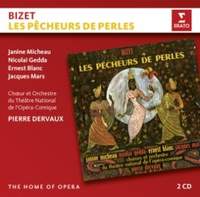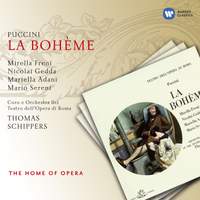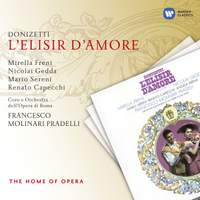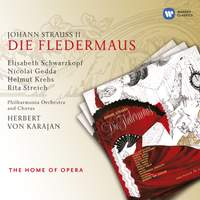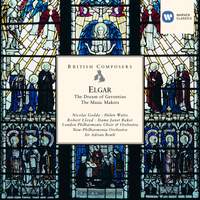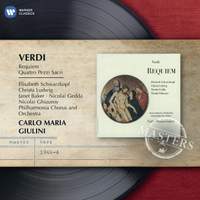Obituary,
Nicolai Gedda (1925-2017)
 The death of the great Swedish tenor Nicola Gedda, one of the most versatile and eloquent singers of the twentieth century, was announced yesterday. He was 91.
The death of the great Swedish tenor Nicola Gedda, one of the most versatile and eloquent singers of the twentieth century, was announced yesterday. He was 91.
Born Harry Gustaf Nikolai Gädda in Stockholm on 11th July 1925, Gedda began his working life in banking and studied privately in his home city, sharing a teacher with that other great Swedish tenor Jussi Björling. He made his debut at the Royal Swedish Opera in 1952, where early engagements included the Italian Singer in Der Rosenkavalier and the title-role in Offenbach’s Les contes d’Hoffmann. Shortly afterwards he attracted the attention of Herbert von Karajan, and debuts at La Scala and the Paris Opera soon followed; in 1957 he made his first appearance at the Metropolitan Opera in New York (as Gounod’s Faust), where he went on to sing regularly for the next couple of decades. His bright, immaculately focused sound, seamless legato and ease in the upper register of the voice, coupled with a natural stage-presence and unmannered sensitivity to text rapidly established him as one of the great singers of a generation which also included Maria Callas, Mirella Freni, Renata Scotto and Joan Sutherland, all of whom he partnered on stage, and by the late 1950s he was much in demand as a recording artist as well as in the world’s greatest opera-houses.
Gedda was an enormously wide-ranging artist, both on stage and in the recording studio (he has 200 recordings to his name and his repertoire encompassed nearly 100 roles), but he excelled in high-lying bel canto roles such as Nemorino (L’elisir d’amore), Edgardo (Lucia di Lammermoor), Arnaud (Guillaume Tell) and Arturo in I Puritani (where he sailed through the notorious high F in the final aria with an ease and grace that remain unparalleled) and in French repertoire, including the eponymous heroes of Offenbach’s Les contes d’Hoffmann, Massenet’s Werther, Gounod’s Faust and Debussy’s Pélleas et Mélisande as well as Don José in Carmen (which he recorded opposite Maria Callas, Victoria de los Angeles and Giulietta Simionato), Nadir in The Pearl Fishers, the Chévalier des Grieux in Massenet’s Manon and Raoul de Nangis in Meyerbeer’s Les Huguenots. His elegant delivery and adroit comic timing also paid real dividends in opėra comique and operetta, which makes up a significant part of his legacy on disc: highlights here include Eisenstein in Die Fledermaus, Camille in Die lustige Witwe, Paris in La belle Hélène, and the fiendishly difficult high tenor roles in Adam’s Le postillon de Lonjumeau (the part in which he had made his debut at the Royal Swedish Opera) and Boieldieu’s La dame blanche. As well as winning huge acclaim in Mozart and the standard Italian lyric roles, he was deeply committed to twentieth-century repertoire, creating the role of Anatol in Samuel Barber’s Vanessa and also taking on Sergey in Shostakovich’s controversial Lady Macbeth of the Mtsensk District, the title-role in Stravinsky’s Oedipus Rex, another Anatol in Prokofiev’s War and Peace, and The Shepherd in Enescu’s Oedipe. Proficient and eloquent in numerous languages, Gedda was also a committed recitalist, shining in Russian song (born to a half-Russian father, he was brought up bilingual) and Liszt in particular. His oratorio repertoire ranged from Bach (including recordings of the Mass in B minor and St Matthew Passion under Otto Klemperer) to Elgar’s Dream of Gerontius; his affinity with French music was also reflected in his work on the concert-platform, where he was particularly celebrated in Berlioz’s Grande Messe des Morts, Roméo et Juliette and La Damnation de Faust.
Thanks to a peerless technique and careful repertoire decisions, Gedda continued to sing well into his seventies, taking on smaller roles such as the Emperor Altoum in Turandot, Monsieur Triquet in Eugene Onegin and the High Priest in Idomeneo, which he recorded for Chandos in 2003 (his last studio outing in opera). Among the honours bestowed on him were the title of Hovsångere (‘Swedish Court Singer’) in 1965, and the Legion d’honneur in 2010. Nicolai Gedda died on 8th January; his family announced his passing a month later. He is remembered as unfailingly generous and congenial colleague as well as a supreme vocal artist: singers who have since paid tribute to his influence on their craft and careers have included Bruce Ford and Michael Fabiano, Thomas Hampson and Ailyn Pérez.
A small selection from Nicolai Gedda's discography
Bizet: Les Pêcheurs de Perles
Nicolai Gedda, Janine Micheau, Ernest Blanc, Jacques Mars; Théâtre National de l'Opéra-Comique, Pierre Dervaux
'The second-act Serenade, “De mon amie fleur endormie”, arguably the score’s most subtle number, is beautifully sung by Gedda' (Gramophone)
Available Format: 2 CDs
Puccini: La Bohème
Mirella Freni, Nicolai Gedda, Mariella Adani, Mario Sereni; Teatro dell’ Opera di Roma, Thomas Schippers
'Gedda makes Rodolfo a so much more lively, impulsive fellow than did either Pavarotti (Karajan) or Bjorling (Beecham): his sound is so full of happiness in the first two acts' (Gramophone)
Available Formats: MP3, FLAC
Donizetti: L'elisir d'amore
Mirella Freni, Nicolai Gedda, Mario Sereni, Renato Capecci; Teatro dell'Opera di Roma, Francesco Molinari Pradelli
'Gedda leaves a vivid memory for many reasons and the voice was exceptionally pure and sweet' (Gramophone)
Available Formats: MP3, FLAC
Johann Strauss II: Die Fledermaus
Elisabeth Schwarzkopf, Nicolai Gedda, Helmut Krebs, Rita Streich, Rudolf Christ; Philharmonia Orchestra & Chorus, Herbert von Karajan
'Eisenstein’s vocal demands are but nothing to Gedda...he meets every demand and appears to have voice to spare' (MusicWeb International)
Available Formats: MP3, FLAC
Elgar: The Dream of Gerontius
Nicolai Gedda, Helen Watts, Robert Lloyd; New Philharmonia Orchestra, Sir Adrian Boult
'Boult has the best Gerontius in Nicolai Gedda, a real tenor' (Classics Today)
Available Formats: MP3, FLAC
Verdi: Requiem
Elisabeth Schwarzkopf), Christa Ludwig, Nicolai Gedda, Nicolai Ghiaurov (bass); Philharmonia Orchestra & Chorus, Carlo Maria Giulini
'It was Giulini’s Nicolai Gedda who showed how the tenor is more an inspiring presence than an egregious showstopper' (Gramophone)
Available Format: 2 CDs


